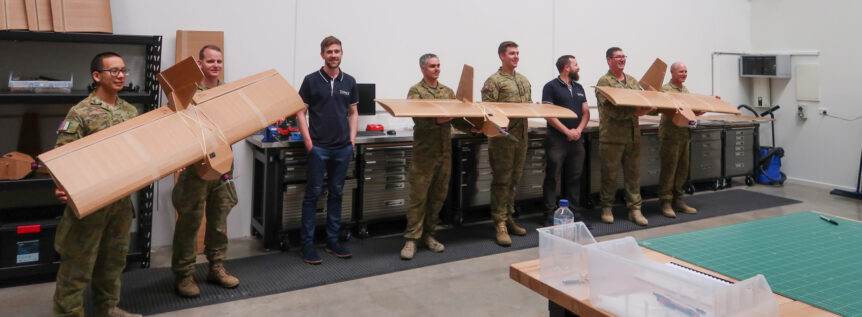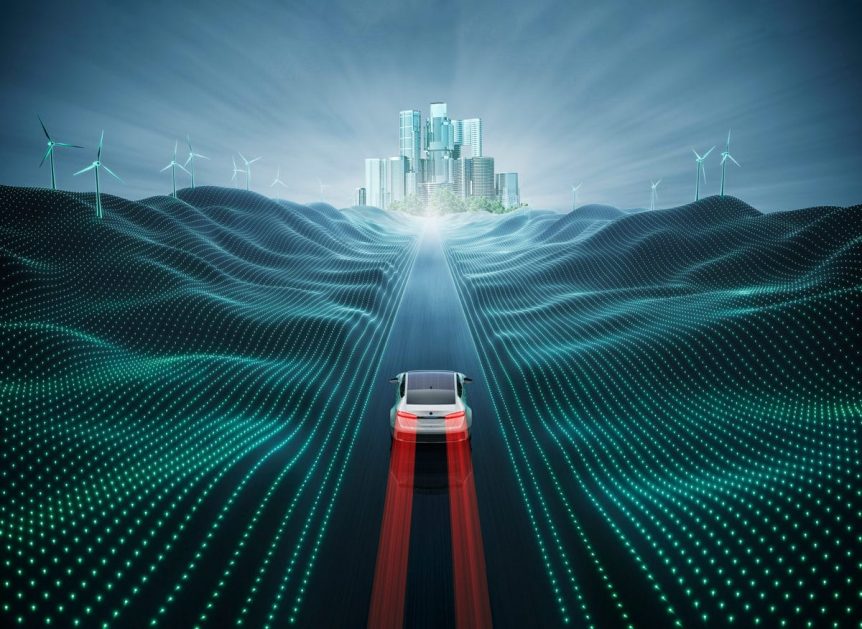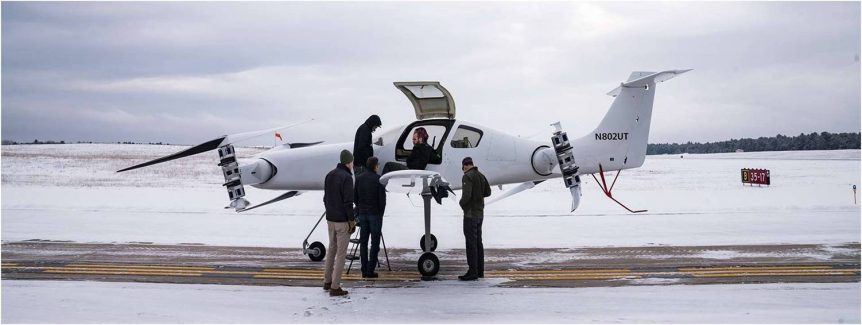Recent news items herald the incredible return on investment the Ukrainian army is getting from its use of small cardboard aircraft. These literally boxy bombers are doing in Russian aircraft and possibly tanks with surprising capability. They may have had an initial inspiration in 2017. Everfly, Otherlab, and Star Simpson At the 2017 Sustainable Aviation Symposium in San Francisco, Star Simpson of Everfly, an affiliate of Otherlab, showed off a cardboard drone intended for humanitarian missions. Read about the craft, its many acronym-related affiliations, and its missions here. Ukrainians and Their Cardboard Air Force On a less humane, but equally important mission, an Australian version of the “pizza-box” technology is wreaking havoc on the Russian Air Force and even Russian tanks. The Sydney (Australia) Daily Herald reported on August 29, “Australian-made cardboard drones have been reportedly used to help bomb a Russian airfield as the Ukrainian military steps up its attacks on Russian territory.” According to the report, Sypaq drones …
Quantumscape Batteries – an Emerging Answer
Hiding in plain site next to the San Jose, California International Airport, Quantumscape has been quietly developing a solid-state battery now emerging and trending toward mass production. With backing from Volkswagen, Bill Gates and a founding member of Tesla, the battery company would make big splash if it used a liquid electrolyte. It doesn’t. Wired goes a bit dramatic in describing the faults of batteries with liquid electrolytes. “IF ELECTRIC VEHICLES are ever going to fully supplant gas guzzlers on the world’s roads, they’re going to need an entirely new type of battery. Despite steady improvements over the past decade in the energy density and lifetimes of lithium-ion batteries, the cells in new EVs still lag behind internal combustion engines on pretty much every performance metric. Most EVs have a range of less than 300 miles, it takes more than an hour to recharge their battery packs, the cells lose nearly a third of their capacity within a decade, and …
Beta Technologies Testing Actual Prototype
Kyle Clark heads Beta Technologies, an aircraft company flying under the radar until recently. Beta’s prototype, based on an RDD LX7, uses eight electric motors driving one fixed-pitch propeller each. These are mounted on rotating tubular arms that allow vertical takeoffs and landings with the propellers in horizontal orientation and a claimed 170 mph cruise when in vertical orientation. VT Digger, an independent non-profit journal, reports, “Using homemade flight simulators, an array of 3D printers, a machine shop, and a team of nearly 40 staff and contracted engineers, Clark has big plans for his self-funded company, which occupies a hangar and other buildings at the Burlington airport. He intends to stand out for creating an aircraft with a power system that enables it to achieve the longest flight range amongst its peers.” “’We’re going to develop the world’s longest-range, best-performing aircraft,’ he said.” Wired, in a snarky mode, describes the Beta Ava as looking, “like what Tony Stark would build …
From the CRADLE to the Breakthrough Battery
Hyundai, the Korean carmaker turning increasingly to electric vehicles, has teamed with Ionic Materials, a Massachusetts-based battery developer to work on an innovative solid-state battery. Ionic’s solid polymer electrolyte technology promised to improve battery safety and performance. Liquid electrolytes are often blamed for disastrous battery fires, so the search for a solid-state alternative is one way to counter the problem. Hyundai’s CRADLE (Center for Robotic-Augmented Design in Living Experiences), “corporate venturing and open innovation business,” is investing in Ionic to gain access to the company’s technology, which also supports lithium-ion cells with no cobalt in their cathodes. Reducing or eliminating cobalt in their batteries may be a major incentive for Hyundai. Forbes reports, “Carmakers, such as Germany’s BMW, and electronic gadget makers, such as Apple, are scouring the world for supplies of cobalt, a rare metal that has tripled in price over the past year to $80,000 a ton, with 60% of global supply coming from the bloody Democratic Republic of …
AEAC Pulls in First 20 Deposits
Aero Electric Aircraft Corporation (AEAC) and Spartan College of Aeronautics and Technology made joint announcements about their signing a “Training Program Development and Deposit Agreement” for the school to reserve the first 20 delivery positions for “Sun Flyer” solar-electric training aircraft being developed by AEAC. This first such agreement by a major training program and an aircraft maker is a milestone for this new technology. The press announcement quotes Peter Harris, CEO of Spartan College, saying, “This agreement signifies our commitment to innovation and to serving the next generation of pilots. Spartan College is honored to be the first training school to formalize our collaboration on a complete training system that will make flight training more modern, accessible and economical than ever before.” The same announcement has George Bye, CEO of AEAC, thanking Spartan College for their collaboration and support. “Our goal with Sun Flyer is to achieve lower operating costs and enhanced safety features for a training airplane by …
Flexibly Keeping Batteries from Blowing their Cool
Meltdown – not a term one wants to hear when confronting an obstinate boss or while levitating in his or her new Tom Swift Electric Octo-copter. But it is a real specter confronting electric vehicle users, and one amplified to positive levels of terror in flight. Two groups of researchers have come up with novel ways of quelling that terror and getting rid of the normally flammable electrolyte that helps make lithium battery fires truly memorable. If researchers at Chapel Hill and Washington State University are successful in their research, that acid electrolyte can be replaced with something safer and as a bonus in both cases, batteries using these new substances will perform better and longer. Researchers at the University of North Carolina at Chapel Hill, led by chemist Joseph DeSimone, Chancellor’s Eminent Professor of Chemistry in UNC’s College of Arts and Sciences and the William R. Kenan Jr. Distinguished Professor of Chemical Engineering at N.C. State University and of …
Chip Yates Chasing New Records
This morning’s email brought the following missive from Chip Yates, known for his high-speed attacks on Pikes Peak, the Bonneville Salt Flats and the skies above China Lake, California. “More good news for our electric airplane programs in the lead-up to our planned attempts to set 4 FAI official world records shortly, and then break our own top speed record of 202.6 mph for electric planes in front of the 150,000 crowd at the California Capital Airshow in Sacramento October 5-6!” Chip’s normal enthusiasm may have shortened the battery life on this Long-ESA (Electric Speed and Distance) record-setting aircraft, since his pushing the pack’s limit in all three motorcycle and aircraft record attempts probably pushed the envelope a bit too far. Jason Paur, reporting in Wired magazine’s “Autopia” section, explains, “During his record-setting flight last July, Yates managed to be the first pilot to top 200 mph in an electric airplane. But he fried the battery in the process. It …
Getting Wired on the e-Spyder
Stephan Boutenko of Alternair passed this along, and it is worth a read. Jason Paur of Wired Magazine’s Autopia web site reports on flying Tom Peghiny’s e-Spyder, a combination of Tom’s Flightstar ultralight with a Yuneec motor, controller and battery. Paur’s impressions are highly positive, with the desire to continue the experience. He notes, “Flying on battery power is about the unique experience of flying without the noise, vibration and smells of a traditional engine pulling you along. It’s an entirely different sensation. And like gliding, it is about the challenge of flying within the limitations of the aircraft and maximizing your time aloft. “’It’s like hypermiling a flight,’ Peghiny says.” Hypermiling in automobiles is the act of conserving fuel by tactics such as accelerating gently to a speed somewhat above the average desired, then coasting to a point below that average and accelerating again. Electric aircraft may require such tactics for at least the immediate future until battery technology …




